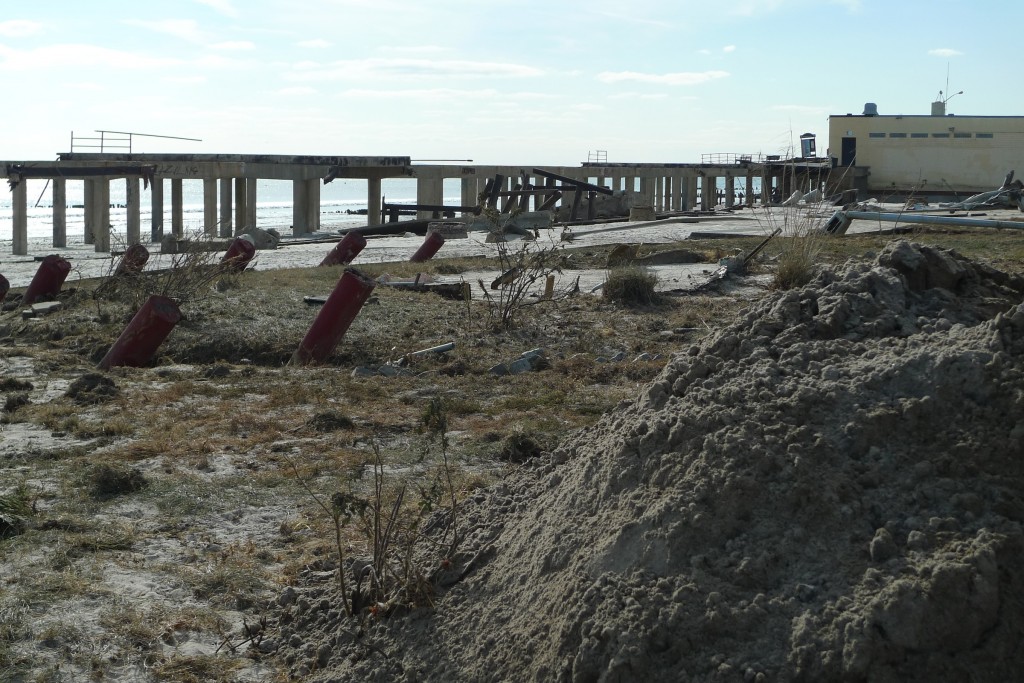How do we now adapt to the climate-changed world that Sandy has woken us up to? Do we continue to militarize the world and talk of “hard” or “soft” options, in a country where hard means tough means masculine means good? And crucially who gets to decide? Early signs are troubling.
Since the storm swept into New York City, a long-frustrated lobby for the construction of a sea-barrier has seen its chance. Touting the $10 billion cost against the $50 billion the storm has supposedly cost, the barrier is presented as a “hard” option that will keep the water out. Except that it will do nothing for the barrier islands that suffered most. And if sea level rise is anything like what has been predicted, then even these barriers will be over-topped if and when a full-blown hurricane hits the region.
Alternatives have been proposed, such as the restoration of wetlands, the natural barrier to storms. We might try and restore shellfish like oysters to New York Harbor, where they used to grow in their millions, as a form of living reef. We can soften the waterfront with wetter and more absorptive environments. And we might have to stop living on the barrier islands, at least on a permanent year-round basis. That might make for cleaner water and beaches.
According to a widely-quoted geologist named Robert Young, however, in the United States:
Retreat is a dirty word.
Why designate a sensible life-protecting and ecological decision as a retreat? Why make the urban decision into a war?
In a long piece in today’s New York Times, the architecture critic Michael Kimmelman offers storm-destroyed communities a choice of futures but also unspecified responsibilities. It’s hard to see what this means in practice, as the costs involved in restoring services and roads are far beyond the reach of increases in local taxation, which is what I take “responsibilities” to mean.
As he thinks this through, Kimmelman gets more and more concerned. He starts thinking about Robert Moses, whose brutalizing pro-auto policies did so much to damage New York and against whom Jane Jacobs campaigned. Kimmelman notes:
His biographer Robert Caro wrote in the 1970s that Moses “bent the democratic processes of the city to his own ends to build public works,” albeit “left to themselves, these processes proved unequal to the building required.”
“The problem of constructing large-scale public works in a crowded urban setting,” Mr. Caro added, “is one which democracy has not yet solved.”
And it still hasn’t.
And out of the eye of the storm, which we were told so often did not discriminate, returns the spectre of Plato and his hatred of democracy.
In fact, the storm has mixed things up in an interesting way. Occupiers have been in discussion with cops and firefighters in Staten Island. National Guard have worked alongside community groups and FEMA has been notably receptive to comment. A democracy is happening. People haven’t had time to get to what’s next. I’ve heard every kind of idea from rebuild to retire or restart the urban idea altogether. There’s no consensus yet. Anyone looked at our supposed leaders, unable to agree on what day it is?
And yet for some, the new normal is just like the old normal, the white guys get to call the shots, pretend its a war and declare themselves winners. What do you expect from a country that still has gladiators?


In his February 2012 Adbusters article titled Post-Crash Fascism http://www.adbusters.org/magazine/100/post-crash-fascism.html, Christian Parenti discussed the catastrophic convergence of crises that military planners at the Pentagon and national security analysts at the NSA and CIA predict will require ever greater responses from their agencies. One of the key crises they are preparing for is the social disruption caused by climate change.
Thanks, Jenny and thanks for pointing out the other important side of the analysis about the active participation of so many women in Occupy Sandy and the recovery effort.
I have noticed that Occupy Sandy has brought out a bunch of women, both in terms of the women who lead NYCHA housing communites and women from OWS who are interested in “concrete” ways to help. Mothers and such.
Bravo, Nick, for your coverage and analysis.